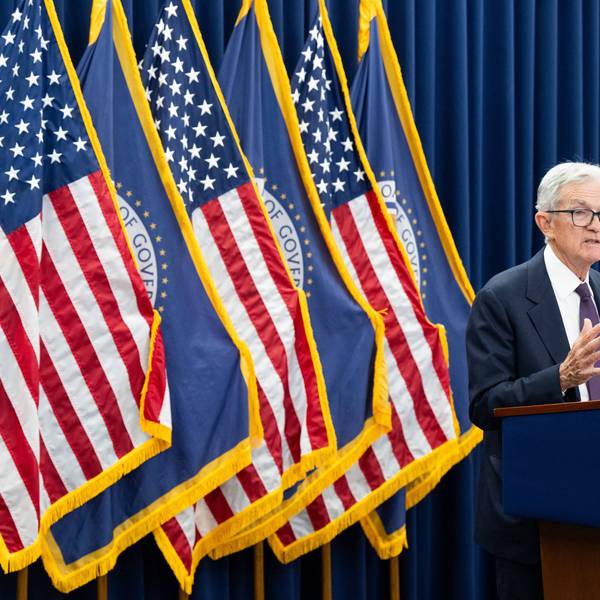Revolving Door: From Top Futures Regulator to Top Futures Lobbyist
While America focused on New Hampshire, a classic example of revolving-door politics took place in Washington, going almost completely unnoticed. It's a move that ranks up there with the hire of Louisiana congressman Billy Tauzin to head the pharmaceutical lobbying conglomerate PhRMA -- at a salary of over $2 million a year -- immediately after Tauzin helped ram through the Medicare Prescription Drug Bill, a huge handout to the pharmaceutical industry.
While America focused on New Hampshire, a classic example of revolving-door politics took place in Washington, going almost completely unnoticed. It's a move that ranks up there with the hire of Louisiana congressman Billy Tauzin to head the pharmaceutical lobbying conglomerate PhRMA -- at a salary of over $2 million a year -- immediately after Tauzin helped ram through the Medicare Prescription Drug Bill, a huge handout to the pharmaceutical industry.
In this case, the hire involves Walter Lukken, who toward the end of the Bush years was the acting head of the Commodity Futures Trading Commission. As the chief regulator of the commodities markets, it was Lukken's job to spot and combat speculative abuses and manipulations that might have led to artificial price hikes and other disruptions.
In 2008, the last full year of his tenure, Lukken presided over some of the worst chaos in the commodities markets in recent history, with major disruptions in the markets for food products like wheat, cotton, soybeans, and rice, and energy commodities like oil.
Most notoriously, 2008 saw a historic spike in the price of oil futures, an enormously destructive speculative bubble that peaked in July of that year at the lunatic high price of $146 per barrel (Goldman, Sachs at the height of the mania was telling investors oil might go to $200 a barrel).
It was Lukken's job to spot the speculative abuses leading to disruptions like that bubble, but he didn't do it. Instead, he repeatedly insisted that there was nothing untoward going on, most notoriously through testimony before the House and the Senate at the height of the oil boom.
Read the full story at Rolling Stone
An Urgent Message From Our Co-Founder
Dear Common Dreams reader, The U.S. is on a fast track to authoritarianism like nothing I've ever seen. Meanwhile, corporate news outlets are utterly capitulating to Trump, twisting their coverage to avoid drawing his ire while lining up to stuff cash in his pockets. That's why I believe that Common Dreams is doing the best and most consequential reporting that we've ever done. Our small but mighty team is a progressive reporting powerhouse, covering the news every day that the corporate media never will. Our mission has always been simple: To inform. To inspire. And to ignite change for the common good. Now here's the key piece that I want all our readers to understand: None of this would be possible without your financial support. That's not just some fundraising cliche. It's the absolute and literal truth. We don't accept corporate advertising and never will. We don't have a paywall because we don't think people should be blocked from critical news based on their ability to pay. Everything we do is funded by the donations of readers like you. Will you donate now to help power the nonprofit, independent reporting of Common Dreams? Thank you for being a vital member of our community. Together, we can keep independent journalism alive when it’s needed most. - Craig Brown, Co-founder |
While America focused on New Hampshire, a classic example of revolving-door politics took place in Washington, going almost completely unnoticed. It's a move that ranks up there with the hire of Louisiana congressman Billy Tauzin to head the pharmaceutical lobbying conglomerate PhRMA -- at a salary of over $2 million a year -- immediately after Tauzin helped ram through the Medicare Prescription Drug Bill, a huge handout to the pharmaceutical industry.
In this case, the hire involves Walter Lukken, who toward the end of the Bush years was the acting head of the Commodity Futures Trading Commission. As the chief regulator of the commodities markets, it was Lukken's job to spot and combat speculative abuses and manipulations that might have led to artificial price hikes and other disruptions.
In 2008, the last full year of his tenure, Lukken presided over some of the worst chaos in the commodities markets in recent history, with major disruptions in the markets for food products like wheat, cotton, soybeans, and rice, and energy commodities like oil.
Most notoriously, 2008 saw a historic spike in the price of oil futures, an enormously destructive speculative bubble that peaked in July of that year at the lunatic high price of $146 per barrel (Goldman, Sachs at the height of the mania was telling investors oil might go to $200 a barrel).
It was Lukken's job to spot the speculative abuses leading to disruptions like that bubble, but he didn't do it. Instead, he repeatedly insisted that there was nothing untoward going on, most notoriously through testimony before the House and the Senate at the height of the oil boom.
Read the full story at Rolling Stone
While America focused on New Hampshire, a classic example of revolving-door politics took place in Washington, going almost completely unnoticed. It's a move that ranks up there with the hire of Louisiana congressman Billy Tauzin to head the pharmaceutical lobbying conglomerate PhRMA -- at a salary of over $2 million a year -- immediately after Tauzin helped ram through the Medicare Prescription Drug Bill, a huge handout to the pharmaceutical industry.
In this case, the hire involves Walter Lukken, who toward the end of the Bush years was the acting head of the Commodity Futures Trading Commission. As the chief regulator of the commodities markets, it was Lukken's job to spot and combat speculative abuses and manipulations that might have led to artificial price hikes and other disruptions.
In 2008, the last full year of his tenure, Lukken presided over some of the worst chaos in the commodities markets in recent history, with major disruptions in the markets for food products like wheat, cotton, soybeans, and rice, and energy commodities like oil.
Most notoriously, 2008 saw a historic spike in the price of oil futures, an enormously destructive speculative bubble that peaked in July of that year at the lunatic high price of $146 per barrel (Goldman, Sachs at the height of the mania was telling investors oil might go to $200 a barrel).
It was Lukken's job to spot the speculative abuses leading to disruptions like that bubble, but he didn't do it. Instead, he repeatedly insisted that there was nothing untoward going on, most notoriously through testimony before the House and the Senate at the height of the oil boom.
Read the full story at Rolling Stone

